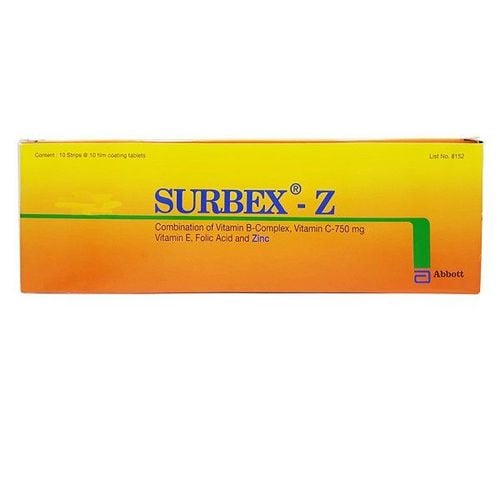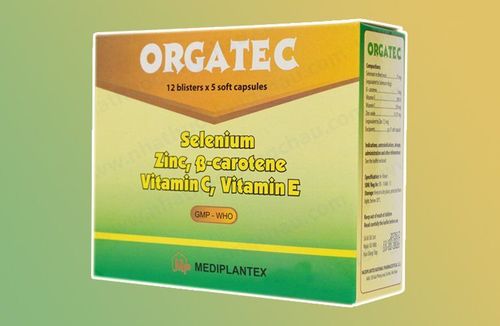This is an automatically translated article.
Zinc sulfate is a vitamin and mineral drug that treats and prevents zinc deficiency in the body. So how to use the drug properly and effectively? Join us to learn more about drugs through the article below.1. What is Zinc Sulfate?
Zinc sulfate, also known as zinc sulfate, is a drug belonging to the group of vitamins and minerals. The drug is prepared in many different forms, specifically:
Tablet form: there are many different strengths such as 20, 50, 66, 90, 110, 220mg. Capsule form: 220mg content. Oral solution form: 13.5mg/ml, 15mg/5ml. Intravenous solution form: 1mg/ml, 3mg/ml, 5mg/ml. Ophthalmic solution form: 0.25%. It works by replenishing zinc in the body to treat zinc deficiency caused by malnutrition, acute or chronic diarrhea. When using, it is necessary to strictly follow the instructions of the doctor.
2. Indications of zinc sulfate
Zinc sulfate medicine is prescribed by doctors to use in the following cases:
Diarrhea patient. People with zinc deficiency. Immunocompromised people. People who often lose hair, need to improve their wounds or maintain their taste buds.
3. How to use zinc sulfate medicine
How to take the medicine:
When taking the medicine, you should drink a lot of water. It is best to take the medicine 1 hour before or 2 hours after eating. However, for patients with stomach irritation, it can be taken with food. Drug users should avoid using the drug along with foods with bran, calcium and phosphorus. These substances can reduce the amount of zinc sulfate absorbed into the body. With intravenous drugs, do not use the drug directly into the vein, but must be diluted and used as a component of the nutrient solution for infusion. In case the patient is using eltrombopag, quinolone antibiotic or tetracycline antibiotic, before taking zinc sulfate, it is necessary to consult a doctor. If you forget to take a dose, take it as soon as you remember. If it is almost time for your next dose, skip the missed dose and take your next dose at the scheduled time. Never use two doses of the drug at the same time. Dosage: The dose of zinc sulphate is different in each sex, age, and subject.
Dosage for adults 19 years and older:
Men: 11mg, up to 34mg. Women: 9mg, maximum 34mg. Pregnant women: 11mg, maximum use 40mg. Lactation: 12mg, maximum dose is 40mg. Metabolically stable adults: 2.5 - 4 mg zinc/day. For normal adults with fluid loss from the small intestine: The recommended dose is 12.2 mg of zinc/liter of small bowel fluid loss or supplemental use of 17.1 mg of zinc/kg of stool or stool waste. ileostomy opening procedure. Dosage of zinc sulfate for children:
For children from 0 to 6 months old: Use 2mg, maximum 4mg. For children from 7 to 12 months old: Use 3mg, use up to 5mg. For children from 1-3 years old: Use 3mg, maximum 7mg. For children from 4 to 8 years old: Use 5mg, maximum use 12mg. For children from 9 to 13 years old: Use 8mg, the maximum amount is 23mg. For children from 14 to 18 years old: 1mg for men, 9mg for women. The maximum intake for both sexes is 34mg. Term infants and children younger than 5 years: The recommended dose is 100mcg zinc/kg/day. Premature babies (weighing less than 1500g) to 3kg: this is recommended dose of 300mcg zinc/kg/day.
4. Side effects when taking drugs
Drugs that cause discomfort such as vomiting, nausea,... Allergic reactions may occur such as rash, hives, itching, difficulty breathing, chest tightness, mouth swelling,... Sensation dry mouth, dry eyes, dry skin. If you experience any of the above side effects or unusual reactions, stop using the drug and contact your doctor for instructions.
5. The interaction of zinc sulfate drugs with food and other drugs
Interactions with other drugs:
Interactions between drugs can change the ability of the drug to work or increase the effect of side effects on the body. Do not stop taking your medicine or change the dose on your own without your doctor's approval. The absorption of zinc can be reduced by iron and calcium supplements, tetracycline antibiotics and phosphorus-containing compounds. Meanwhile, zinc can reduce the absorption of iron and some groups of antibiotics such as tetracyclines, fluoroquinolones. Zinc sulfate may inhibit copper absorption. Thiazide diuretics can increase urinary excretion of zinc by up to 60%. Interaction with food:
Zinc should not be taken with foods containing a lot of calcium and phosphorus such as milk, cheese, yogurt, ice cream, beans, nuts, butter, peanuts, beer, soft drinks, hot cocoa , ... because they reduce zinc absorption. Take zinc at least 2 hours before or after eating foods rich in fiber for maximum absorption of zinc.
6. Some notes when taking drugs
Pregnant and lactating women should not self-medicate because zinc sulfate can cross the placenta and pass into breast milk. Before using, both of these objects need to be thoroughly consulted by a doctor. Use caution when administering zinc sulfate to patients with renal impairment. Regularly check serum copper, zinc, and alkaline phosphatase levels in patients receiving intravenous drugs or those on chronic therapy. Patients with impaired renal function or long-term use of high doses of intravenous drugs are likely to have an increased risk of aluminum toxicity. In case of emergency or overdose, it is necessary to stop using the drug, give the patient a soothing agent such as milk, use complexing agents. Because zinc is corrosive, avoid gastric lavage and induce vomiting in overdose.
7. Pharmacodynamics of drugs
Zinc is a micronutrient present in most of the human body and involved in many metabolic processes and immune functions of the body. Zinc has the effect of reducing ion excretion, synthesizing nitric oxide and improving appetite, absorption, regeneration of small intestine cells, restoring intestinal enzymes and intestinal permeability. Oxidative damage from free radicals, nitric oxide, is responsible for some intestinal malabsorption syndromes and diarrhea. Zinc is recognized as a potential antioxidant for the immediate and long-term effects of the human body.Mechanism of action:
Zinc is an essential mineral found in most human cells, mainly in the bones, skin, hair, liver, muscles and testicles (in men). Zinc stimulates the activity of enzymes that catalyze biochemical reactions in the body. Zinc is essential for a strong immune system, which is able to fight infections and prevent colds and flu. In addition, zinc also helps to heal wounds, stimulates the production of new cells, restores cells that have been damaged by free radicals. In addition, zinc is necessary for the synthesis of DNA, stimulates the metabolism of vitamin A, the functioning of vision and the central nervous system. At the same time, zinc is also involved in supporting the normal growth and development of the fetus in the womb and the maturation process. The prolonged process of diarrhea deprives the human body of a significant amount of zinc, which is necessary for the human body. The consequence of this problem is to slow down the regeneration process, restore the structure and function of intestinal mucosal cells, leading to prolonged diarrhea. Therefore, zinc supplementation has the potential to reduce diarrhea in people with persistent diarrhea.
8. Pharmacokinetics
Zinc is absorbed from the small intestine and the pharmacokinetics of absorption may be saturated with increasing dose. The rate of zinc absorption does not correlate with the amount of zinc added to the body. In the blood, zinc is absorbed largely distributed to red blood cells, the remainder is bound to plasma proteins. Zinc is stored mainly in the liver and is excreted in feces, urine, and sweat. It is mainly through feces because that is also the way to excrete endogenous zinc from the intestine.
Sulfate zinc is a medicine that has a very good effect on the human body. Therefore, it is necessary to have a proper understanding of how to use the drug as well as how to handle it in case it is necessary to be able to use it properly and effectively.
Please dial HOTLINE for more information or register for an appointment HERE. Download MyVinmec app to make appointments faster and to manage your bookings easily.













